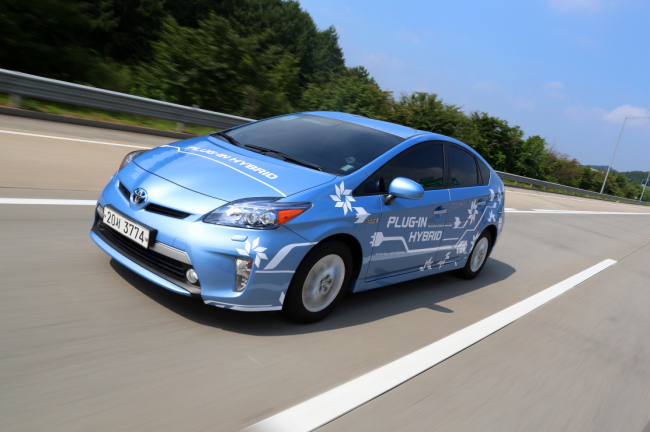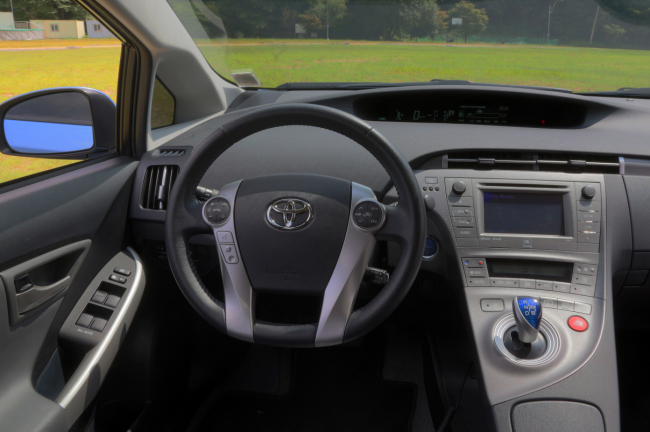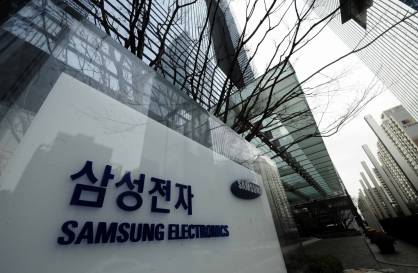After a spin in the Prius Plug-in Hybrid from Toyota, I was bowled over by its tenacity, strength and overall efficiency.
Covering various types of roads from the jam-packed streets of Gangnam to the hills of Songnisan Mountain in Chungcheong Province, the Prius Plug-in ― not yet commercially available in Korea ― proved to be a very, very able little engine with plenty of finesse.

As the name indicates, the plug-in is powered up by plugging into an electric socket using what looks like an enlarged version of the common electric plug connected to the car’s fuel tank.
“Fill” her up for 90 minutes from any socket with up to 220 V of electricity and off you go. This is a particularly good option in Korea where fast-charging stations are still little more than a dream for electric car buffs.
One charge will take you as far as 24.6 kilometers. Once the car depletes the batteries ― lithium ion co-developed with Panasonic ― it seamlessly switches to the engine for power: hence, the name “hybrid.”
As expected, fuel economy for the Prius Plug-in was superb. The official efficiency is above 30 kilometers per liter in Japanese standards. The figure has yet to be converted into Korean numbers, but no matter how I hard I tried to pull the efficiency down, I ended up with more than 20 kilometers per liter.

About how the car felt on the road, the Prius hybrid belongs to the mid-sized segment but it is bigger than you may think in terms of leg room and trunk space, and it also acts like a bigger car.
Having said this, handling was better than most cars I’ve driven in this range (the Avante, for instance) and steering was a pro. Basically, the car stuck to the road like glue and cornering was never a problem, which is more than you can say when you’re in the mountains where we’re talking about 90 degree turns.
For the skeptics who scorn electric cars for lacking character, I have to say it’s quite a different story for hybrids. Unlike 100 electric cars that run silently and are outfitted with artificial sounds to alert pedestrians ― the hybrid has an engine that conveys the power of the engine to the driver.
It must be understood, however, that when a car runs on batteries, you can’t really expect to feel like a dynamo behind the wheel because they aren’t meant to be exciting. The maximum speed is 100 kilometers, what do you expect.
If you’re looking for a reliable, vastly efficient, comfortable and clutter-free family car ― or if you’re someone who’s constantly on the move like I am ― I would strongly recommend the Prius. It doesn’t have to be the hybrid or the plug-in I drove. I believe any member of the Prius-hood, whose total sales exceed 5 million cars, would be a great choice.
Even the toned down interior of the Prius was precisely to my taste ― I detest having to navigate all the little knobs and buttons in the console (a car is for driving, not to play around in!). As you can see in the photo, the cabin display was one of the most minimalist interiors ever. I heard this was done intentionally to enhance driving safety.
What the dashboard did show was the battery being recharged whenever you hit the brakes, meaning this vehicle never stops being productive. There’s also the fun of watching the fuel efficiency gauge.
The price tag on the Prius Plug-in in Japan starts from 3.2 million yen, which is around 35 million won. The warranty lasts up to eight years.
However, the design on the Prius could be a bit more advanced. Many of the ladies I talked to were of the same opinion, so I’m hoping Toyota will improve on this in the fourth-generation that’s coming.
My last word is to the people say the hybrid and the e-car is still a long way off from becoming mainstream: the day may come sooner than you think that you’ll trade in your gas-guzzler for these cars of the future.
By Kim Ji-hyun (jemmie@heraldcorp.com)
-
Articles by Korea Herald



![[KH Explains] No more 'Michael' at Kakao Games](http://res.heraldm.com/phpwas/restmb_idxmake.php?idx=644&simg=/content/image/2024/04/28/20240428050183_0.jpg&u=20240428180321)




![[Grace Kao] Hybe vs. Ador: Inspiration, imitation and plagiarism](http://res.heraldm.com/phpwas/restmb_idxmake.php?idx=644&simg=/content/image/2024/04/28/20240428050220_0.jpg&u=)


![[Herald Interview] Mom’s Touch seeks to replicate success in Japan](http://res.heraldm.com/phpwas/restmb_idxmake.php?idx=644&simg=/content/image/2024/04/29/20240429050568_0.jpg&u=)








